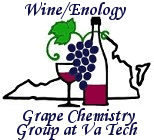 Enology
Notes #73, March 31, 2003
Enology
Notes #73, March 31, 2003
To: Regional Wine Producers
From: Bruce Zoecklein, Head, Enology-Grape Chemistry Group, Virginia Tech
Subject: Technical Winemakers Roundtable; Cork Symposium; Winery Planning and Design Workshop
Technical Winemakers Roundtable.
Our thanks to Dr. Sibylle Krieger and Sigrid Gersten-Briand of Lallemond Inc. for their program on management of lactic acid bacteria. Dr Krieger presented research data and practical conclusions on a variety of MLF-related topics.
She discussed the practical use of Lysozyme for the prevention or delay of MLF. This is a naturally occurring enzyme isolated from egg whites, which degrades the cell walls of gram positive bacteria such as Oenococcus, Pediococcus, and Lactobacillus.
Added in concentrations of 200-300 mg/L, Lysozyme kills in about 12 hours, although there is some strain variation. Lysozyme can precipitate in white wines and, therefore, should be removed with bentonite. As such, it may not be optimum for white wines, and is not used for post-MLF stabilization.
Dr. Krieger discussed the timing of MLF in relationship to yeast fermentation. Timing depends on the yeast strain, the bacterial strain and pH. For example, Oenococcus oeni changes its metabolism, depending on the pH. Below pH 3.5, the organism degrades organic acids.
She gave an example of a Chardonnay with the yeast and Oenococcus oeni fermentation occurring together, vs. the same wine where the bacterium was added post-fermentation. With the simultaneous fermentation, the MLF was completed in 20 days. Added after fermentation, the MLF was completed in 60 days. Under the conditions of the study, the simultaneously fermented wine had a higher fruit intensity and lower butter (diacetyl) perception. For white wines at or below pH 3.5, simultaneous yeast and bacterial fermentation may be desirable. It is important to have a high concentration of bacteria and a strong yeast strain.
Additional issues regarding MLF were outlined in Enology Notes # 71 and # 72
ASEV Eastern Section 28th Annual Conference: Wine Closures
The symposium program will answer all the questions you ever had about wine bottle closures. A historic look back at wine storage and closures will lay the groundwork for today's options: natural, technical and synthetic corks, crown and screw caps. National and international experts from academia and industry will address expectations, production techniques and performance criteria for each type.
The efforts to eliminate TCA from natural corks, the research and performance of screw caps since 1974, the current status of technical and synthetic corks, quality control protocols, cost comparisons and practical "How to" issues will be addressed. Participants will have the opportunity to evaluate TCA and other musty aroma, and taste samples stored with different closures. Industry and consumer perspectives will be discussed, and finally a Crystal Ball, "The Perfect Wine Closure in 2020" will be offered.
Confirmed speakers:
For more information visit the ASEV-Eastern Section website: http://www.nysaes.cornell.edu/fst/asev
Winery Planning and Design Workshop - May 31, 2003, Leesburg, VA
A one day Winery Planning and Design Workshop is scheduled for May 31, 2003 at the Holiday Inn Leesburg at Historic Carradoc Hall, 1500 East Market Street, Leesburg, Virginia. This program is for those seriously interested in entering the commercial wine industry.
This event is hosted by Loudoun Cooperative Extension and coordinated by Dr. Bruce Zoecklein, Head, Enology Grape Chemistry Group, Virginia Tech. Here are directions, in Adobe Acrobat format.
The workshop will include presentations, discussions, and printed materials on the following:
The workshop fee is $250 payable to "Bruce Zoecklein's Foundation." Checks can be mailed to:
Ms. Terry Rakestraw
Food Science and Technology,
Virginia Tech - 0418,
Blacksburg, VA 24061.
Pre-registration is required and enrollment capacity is limited.
Additional program information is available from Ms. Terry Rakestraw at e-mail rakestra@vt.edu or by phone at (540) 231-6805.
Subscription to Enology Notes. All past Enology Notes and Vintner's Corner newsjournals are posted on the Enology-Grape Chemistry Group's web site at: http://www.fst.vt.edu/zoecklein/index.html or http://www.vtwines.info/. Enology Notes are slightly different in content from the subscription based Vintner's Corner newsjournal.
To be added to the Enology Notes list serve send an email message to bzoeckle@vt.edu with the word "ADD" or "REMOVE" in the subject line.
Dr. Bruce Zoecklein
Professor and Enology Specialist
Head Enology-Grape Chemistry Group
Department of Food Science and Technology
Virginia Tech
Blacksburg VA 24061
Enology-Grape Chemistry Group Web address: www.vtwines.info or www.fst.vt.edu/zoecklein/index.html
Phone: (540) 231-5325
Fax: (540) 231-9293
Email: bzoeckle@vt.edu